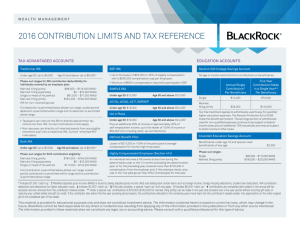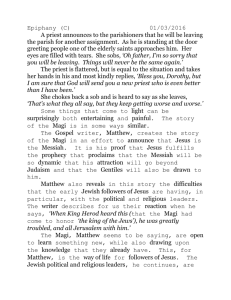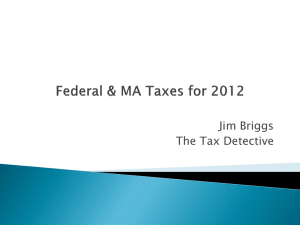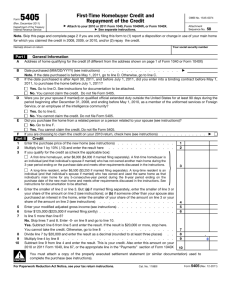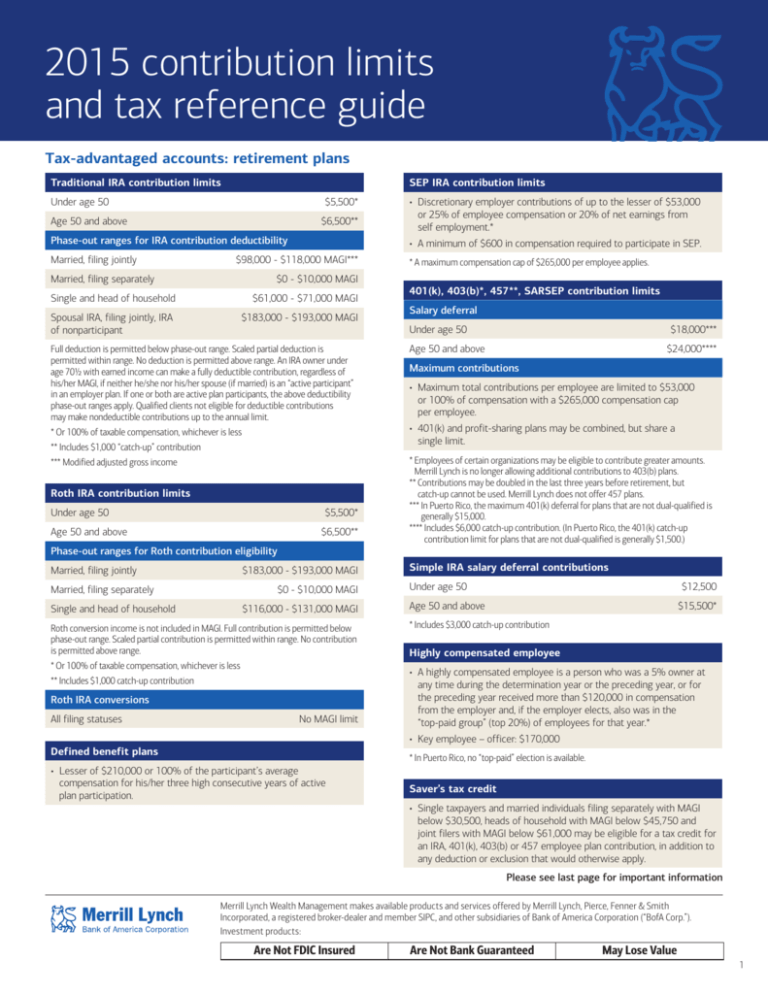
2015 contribution limits
and tax reference guide
Tax-advantaged accounts: retirement plans
Traditional IRA contribution limits
SEP IRA contribution limits
Under age 50
$5,500*
Age 50 and above $6,500**
• D
iscretionary employer contributions of up to the lesser of $53,000
or 25% of employee compensation or 20% of net earnings from
self employment.*
Phase-out ranges for IRA contribution deductibility
• A minimum of $600 in compensation required to participate in SEP.
Married, filing jointly * A maximum compensation cap of $265,000 per employee applies.
Married, filing separately Single and head of household Spousal IRA, filing jointly, IRA
of nonparticipant
$98,000 - $118,000 MAGI***
$0 - $10,000 MAGI
$61,000 - $71,000 MAGI
$183,000 - $193,000 MAGI
Full deduction is permitted below phase-out range. Scaled partial deduction is
permitted within range. No deduction is permitted above range. An IRA owner under
age 70½ with earned income can make a fully deductible contribution, regardless of
his/her MAGI, if neither he/she nor his/her spouse (if married) is an “active participant”
in an employer plan. If one or both are active plan participants, the above deductibility
phase-out ranges apply. Qualified clients not eligible for deductible contributions
may make nondeductible contributions up to the annual limit.
* Or 100% of taxable compensation, whichever is less
** Includes $1,000 “catch-up” contribution
*** Modified adjusted gross income
Roth IRA contribution limits
Under age 50
$5,500*
Age 50 and above
$6,500**
Phase-out ranges for Roth contribution eligibility
Married, filing jointly Married, filing separately
Single and head of household $183,000 - $193,000 MAGI
$0 - $10,000 MAGI
$116,000 - $131,000 MAGI
Roth conversion income is not included in MAGI. Full contribution is permitted below
phase-out range. Scaled partial contribution is permitted within range. No contribution
is permitted above range.
* Or 100% of taxable compensation, whichever is less
** Includes $1,000 catch-up contribution
Roth IRA conversions
All filing statuses
No MAGI limit
401(k), 403(b)*, 457**, SARSEP contribution limits
Salary deferral
Under age 50
$18,000***
Age 50 and above
$24,000****
Maximum contributions
• M
aximum total contributions per employee are limited to $53,000
or 100% of compensation with a $265,000 compensation cap
per employee.
• 4
01(k) and profit-sharing plans may be combined, but share a
single limit.
* E mployees of certain organizations may be eligible to contribute greater amounts.
Merrill Lynch is no longer allowing additional contributions to 403(b) plans.
** C ontributions may be doubled in the last three years before retirement, but
catch-up cannot be used. Merrill Lynch does not offer 457 plans.
*** In Puerto Rico, the maximum 401(k) deferral for plans that are not dual-qualified is
generally $15,000.
**** Includes $6,000 catch-up contribution. (In Puerto Rico, the 401(k) catch-up
contribution limit for plans that are not dual-qualified is generally $1,500.)
Simple IRA salary deferral contributions
Under age 50
$12,500
Age 50 and above $15,500*
* Includes $3,000 catch-up contribution
Highly compensated employee
• A
highly compensated employee is a person who was a 5% owner at
any time during the determination year or the preceding year, or for
the preceding year received more than $120,000 in compensation
from the employer and, if the employer elects, also was in the
“top-paid group” (top 20%) of employees for that year.*
• Key employee – officer: $170,000
Defined benefit plans
* In Puerto Rico, no “top-paid” election is available.
• Lesser
of $210,000 or 100% of the participant’s average
compensation for his/her three high consecutive years of active
plan participation.
Saver’s tax credit
• S
ingle taxpayers and married individuals filing separately with MAGI
below $30,500, heads of household with MAGI below $45,750 and
joint filers with MAGI below $61,000 may be eligible for a tax credit for
an IRA, 401(k), 403(b) or 457 employee plan contribution, in addition to
any deduction or exclusion that would otherwise apply.
Please see last page for important information
Merrill Lynch Wealth Management makes available products and services offered by Merrill Lynch, Pierce, Fenner & Smith
Incorporated, a registered broker-dealer and member SIPC, and other subsidiaries of Bank of America Corporation (“BofA Corp.”).
Investment products:
Are Not FDIC Insured
Are Not Bank Guaranteed
May Lose Value
1
Tax-advantaged accounts: education plans
Section 529 College Savings Account
Coverdell Education Savings Account
No age or income restrictions for contributors or beneficiaries.
Limitation on amount of contributions not subject to federal gift tax.
Beneficiaries under age 18 and
special needs beneficiaries of any
age (maximum contribution)
Annual
Contribution*
Five-Year
Contribution Made
in a Single Year**
Single
$14,000
per beneficiary
$70,000
per beneficiary
$28,000
$140,000
Married couple
* Contributions are completed gifts subject to the annual federal gift-tax exclusion
and are removed from the contributor’s federal estate.
** Contributions between $14,000 and $70,000 ($28,000 and $140,000 for married
couples filing jointly) made in one year can be prorated over a five-year period
without subjecting you to federal gift tax or reducing your federal unified estate
and gift tax credit. If you contribute less than the $70,000 ($140,000 for married
couples filing jointly) maximum, additional contributions can be made without
you being subject to federal gift tax, up to a prorated level of $14,000 ($28,000
for married couples filing jointly) per year. Federal gift taxation may result if a
contribution exceeds the available annual gift tax exclusion amount remaining
for a given beneficiary in the year of contribution. For contributions between
$14,000 and $70,000 ($28,000 and $140,000 for married couples filing jointly)
made in one year, if the account owner dies before the end of the five-year
period, a prorated portion of the contribution may be included in his or her
gross estate for federal estate tax purposes. Also, any appreciation allocable
to the remaining years in the five year period on the entire original gift is not
considered part of the estate.
$2,000
Phase-out ranges for Coverdell ESA contribution eligibility
Single
$95,000 - $110,000 MAGI
Married, filing jointly
$190,000 - $220,000 MAGI
Student loans
Student loan interest deduction limit
$2,500
Phase-out ranges for student loan interest deduction eligibility
Single and head of household Married, filing jointly
$65,000 - $80,000 MAGI
$130,000 - $160,000 MAGI
Lifetime learning credits*
20% of first $10,000 of educational expenses (max $2,000) per
tax return
Phase-out ranges for credit eligibility
Single and head of household Married, filing jointly
$55,000 - $65,000 MAGI
$110,000 - $130,000 MAGI
* Credit not available if married, filing separately.
Section 529 plan tax treatment
• S
ection 529 plan earnings grow federal and, in most cases, state
income-tax-free as long as the withdrawals are used for qualified
higher education expenses. The earnings portion of withdrawals
for nonqualified expenses will be subject to federal income tax and
potentially a 10% additional federal tax, and may also be subject to
state income or other taxes.
American Opportunity Tax Credit*
100% of first $2,000 of education expenses; plus 25% of expenses
above $2,000 and up to $4,000 (maximum credit is $2,500) per
eligible student
Phase-out ranges for credit eligibility
Single and head of household Married, filing jointly
$80,000 - $90,000 MAGI
$160,000 - $180,000 MAGI
* Credit not available if married, filing separately.
Phase-out of exclusion of U.S. savings bond income
By payor of qualified higher education expenses
Phase-out ranges for exclusion eligibility
Married, filing jointly
All others
M ER R ILL LYN CH WEA LT H MA N A GEMEN T
$115,750 - $145,750 MAGI
$77,200 - $92,200 MAGI
I
2015 Co n tr ibutio n Lim its an d T ax Re f e re nc e Gu ide
2
HSA contribution and plan limits
HSA Limits
The following table shows the minimum annual deductible and maximum annual deductible and other out-of-pocket expenses for high deductible health plans
(HDHPs) for 2015, as well as the maximum annual HSA contribution.
Minimum Deductible
Maximum Out-of-Pocket*
Contribution Limit
55+ Contribution
Single
$1,300
$6,450
$3,350
$1,000
Family
$2,600
$12,900
$6,650
$1,000
* These limits do not apply to deductibles and expenses for out-of-network services if the plan uses a network of providers. Instead, only deductibles and out-of-pocket expenses for
services within the network should be used to figure whether the limits apply.
To be an eligible individual and qualify for an HSA, you must:
• be covered under an HDHP on the first day of the month,
• not be enrolled in Medicare benefits, and
• have no other health coverage*,
• not be claimed as a dependent on someone else’s tax return.
For more detailed information on HSAs and taxes, visit the U.S. Department of Treasury Web site at www.ustreas.gov or talk with your tax advisor.
* Coverage under a limited-purpose health care flexible spending arrangement is permissible.
Federal tax brackets
Single
Married, filing separately
Taxable income over
But not over
Tax rate is
Taxable income over
But not over
Tax rate is
0
$9,225
10%
$0
$9,225
10%
$9,225
$37,450
$922.50 plus 15%*
$9,225
$37,450
$922.50 plus 15%*
$37,450
$90,750
$5,156.25 plus 25%*
$37,450
$75,600
$5,156.25 plus 25%*
$90,750
$189,300
$18,481.25 plus 28%*
$75,600
$115,225
$14,693.75 plus 28%*
$189,300
$411,500
$46,075.25 plus 33%*
$115,225
$205,750
$25,788.75 plus 33%*
$411,500
$413,200
$119,401.25 plus 35%*
$205,750
$232,425
$55,662 plus 35%*
$119,996.25 plus 39.6%*
$232,425
$413,200
$64,989.25 plus 39.6%*
* of the excess over the taxable income in the far left-hand column.
* of the excess over the taxable income in the far left-hand column.
Married, filing jointly/qualifying widow(er)
Estates and trusts
Taxable income over
But not over
Tax rate is
Taxable income over
But not over
$0
$18,450
10%
$0
$2,500
15%
$18,450
$74,900
$1,845 plus 15%*
$2,500
$5,900
$375 plus 25%*
$74,900
$151,200
$10,312.50 plus 25%*
$5,900
$9,050
$1,225 plus 28%*
$151,200
$230,450
$29,387.50 plus 28%*
$9,050
$12,300
$2,107 plus 33%*
$230,450
$411,500
$51,577.50 plus 33%*
$12,300
$411,500
$464,850
$111,324 plus 35%*
$464,850
$129,996.50 plus 39.6%*
* of the excess over the taxable income in the far left-hand column.
Head of household
Taxable income over
But not over
Tax rate is
$0
$13,150
10%
$13,150
$50,200
$1,315 plus 15%*
$50,200
$129,600
$6,872.50 plus 25%*
$129,600
$209,850
$209,850
$411,500
$439,000
Tax rate is
$3,179.50 plus 39.6%*
* of the excess over the taxable income in the far left-hand column.
Long-term capital gains and qualified dividend rates
The federal income tax rate for long-term capital gains or qualified dividend
income is 0% for individuals in the 10% or 15% tax brackets, 15% for
individuals in the 25% to 35% tax brackets, and 20% for individuals in
the 39.6% bracket. An additional 3.8% medicare tax is imposed on “net
investment income” of married individuals filing jointly with MAGI above
$250,000, married individuals filing separately with MAGI above $125,000 and
all other filers with MAGI above $200,000.
Gains on collectibles
maximum 28%
$26,722.50 plus 28%*
Unrecaptured 1250 depreciation
maximum 25%
$411,500
$49,192.50 plus 33%*
Gift and estate taxes
$439,000
$115,737 plus 35%*
Gift tax annual exclusion
$125,362 plus 39.6%*
* of the excess over the taxable income in the far left-hand column.
Unified estate, gift, and generation-skipping transfer tax exemption
Annual exclusion for gifts to noncitizen spouse
$14,000
$5.43 million
$147,000
Top gift-tax rate
40%
Top estate-tax rate
40%
Single generation-skipping transfer tax rate
40%
M ER R ILL LYN CH WEA LT H MA N A GEMEN T
I
2015 Co n tr ibutio n Lim its an d T ax Re f e re nc e Gu ide
3
Deductions
Standard deductions
Exemptions
Married, filing jointly/qualifying widow(er)
$12,600
Personal and dependent
$4,000
$1,050
Single
$6,300
Kiddie tax
Married, filing separately (assuming spouse
does not itemize, otherwise $0)
$6,300
Phase-out ranges for Personal and Dependent Exemptions
Head of household $9,250
Married, filing jointly
$309,900 - $432,400 AGI
Single
$258,250 - $380,750 AGI
Married, filing separately
$154,950 - $216,200 AGI
Head of household
$284,050 - $406,550 AGI
Social Security
Maximum earnings subject to FICA
$118,500
For 2015, the Social Security portion of the employee FICA tax rate is 6.2%.
Post-retirement
The amount of Social Security benefit payments (if any) subject to tax depends on the amount of the taxpayer’s provisional income (AGI plus one-half of the
Social Security benefits plus tax-exempt bond interest plus certain other adjustments).
If provisional income exceeds $32,000 ($25,000 for single, head of household and married filing separately (live apart from your spouse), then the amount of
Social Security benefits included in gross income is the lesser of:
• 50% of the Social Security benefits received that year, or
• 50% of the excess of provisional income over $32,000 (or $25,000).
However, if provisional income exceeds $44,000 ($34,000 for single, head of household and married filing separately (live apart from your spouse), then the
amount of Social Security benefits included in gross income is the lesser of:
• 85% of the Social Security benefits received that year, or the sum of:
– The amount included under the above 50% rule or, if less, one-half of the difference between $44,000 (or $34,000) and $32,000 (or $25,000) and
– 85% of the excess of provisional income over $44,000 ($34,000).*
* If you are married filing separately and live with your spouse, up to 85% of your Social Security benefits are taxable.
Call for more information:
[XXX.XXX.XXXX]
[Financial Advisor’s name]
[Business street address]
[City, State, Zip code]
[http://fa.ml.com/website]
[Additional information]
Neither Merrill Lynch nor any of its affiliates or financial advisors provide legal, tax or accounting advice. You should consult your legal and/or tax
advisors before making any financial decisions.
© 2014 Bank of America Corporation. All rights reserved. | ARLWPWG8 | 313225PM15-1014
M ER R ILL LYN CH WEA LT H MA N A GEMEN T
I
2015 Co n tr ibutio n Lim its an d T ax Re f e re nc e Gu ide
4

